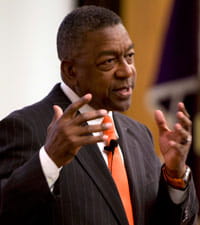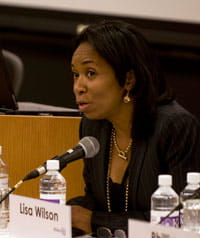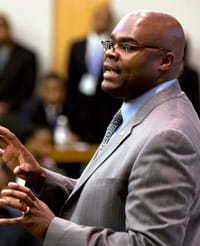Tap African-American community for talent, urge experts, who note persistent challenges facing blacks on corporate ladder; three-day event includes Cornel West keynote
3/11/2008 -
| |
 |
Related Video |
|
| |
| |
|
| After Robert Johnson sold Black Entertainment Television to Viacom for $3 billion, he founded a company called RLJ Enterprises that now has holdings in myriad business sectors: banking, hotels, private equity, hedge funds, film, auto dealerships and gaming. In many of those areas, as with BET, Johnson looks to African-Americans both as employees and potential consumers.
“If you take talented African-Americans and put resources and a vision behind them, you can penetrate [market] areas that, for whatever reason, have been under-penetrated,” said Johnson, who delivered a keynote address March 8 at the Kellogg School’s 21st
Black Management Association Conference, a student-led event held at the James L. Allen Center. But relatively few businesses have figured out that strategy, he said. “There is, in effect, a glass ceiling for African-Americans and other minorities and women because there is an old-boy network.”
 |
| Robert L. Johnson, founder and chairman on RLJ Companies, delivered one of three keynotes at the 2008 BMA Conference at the Kellogg School on March 8. |
| Photo © Nathan Mandell |
 |
| As a panelist at the March 8 BMA Conference, Lisa Wilson '02, founder/COO of the Mentoring Center, discussed the need to develop leaders. |
| Photo © Nathan Mandell |
 |
| Don Thompson, president of McDonald's USA, delivered a keynote address March 8 at the Kellogg BMA Conference. |
| Photo © Nathan Mandell |
Johnson said he found cracks in that glass ceiling in his early days partly by strategically partnering with white-owned companies to gain what he termed a “Good Housekeeping seal of approval.”
“The first time you walk in the door, there’s a skepticism: ‘They don’t know how to run a business,’” he told the audience, gathered for the middle day of the three-day conference. “You’ve got to remove that.” When Johnson forged the right partnerships, he said perceptions changed. “You could almost hear people say, ‘Oh, he’s got a white guy with him,’” recalled Johnson. “But it doesn’t have to be a white guy — it can be someone else who’s been successful.”
Johnson’s remarks underscored the conference theme — “The Defining Moment: Understanding the Power of Collaboration to Effect Change.” The sold-out event began March 7 with an evening networking reception in Chicago at Bin 36. The following day brought business leaders, academics and students together in Evanston for a variety of events, including an alumni town hall meeting, a prospective student information session, keynote speakers and panel discussions. The day concluded with a banquet featuring an address by Dr. Cornel West, professor of religion and African-American studies at Princeton University. The conference’s final day included a gospel brunch.
In his March 8 dinner remarks, West told conference attendees: “We’re living in a moment in which there is an awakening taking place. … How do we define ourselves … as persons who have slots in different structures, to play a part in this awakening, in melting this political ice age that we’ve been wrestling with for the last 28 years?”
He stated that American politics, especially since 1980, has contributed to widespread tolerance of suffering and has tended to obscure that suffering.
“From 1980 to 2008 [we lived in] a political ice age, a historical moment when it is fashionable to be indifferent to the suffering of other people,” West said. “And that indifference often targets the most vulnerable, so you can render their suffering hidden. Concealed. Invisible.”
West noted that the African-American experience is one intimately linked with “the catastrophic,” which he said included a range of tragic events, from slavery to Jim Crow laws, lynching and “the psychic death of hating yourself.” Through various strategies, including what he called “elegance,” black Americans have been able to persist through these trials despite the odds.
"No one of us escaped the prison-industrial complex in our families and friends," West said. "Or the disgraceful school systems in our 'chocolate cities.' ...Or not enough healthcare or childcare, or a living wage."
Too often, he added, the history of America has been an attempt to “deodorize the catastrophic in such a way that we can turn our backs and no longer believe in lifting [others] as we climb.”
Speaking during the Saturday session was McDonald’s USA President Don Thompson, who urged successful African-Americans to reach into the community to help pull others up the success ladder. He suggested a number of ways to effect this change, including by mentoring young people and showing them the corporate opportunities that could await them. “Every one of us has a role to play,” Thompson said. “There are things we are called to do, and we don’t have a choice but to answer.”
An electrical engineer by training who began in such a position at McDonald’s 18 years ago, Thompson said blacks have made progress in corporate America but still face hurdles. “I don’t think we’re any worse off,” he said. “But we could be doing a whole lot better than we are.” Making noise about the need for greater progress must be coupled with strategic thinking about how to bring it about, Thompson added.
Research at the Kellogg School has shone light on that challenge, showing that even most white people who want to — and believe they are — judging African-Americans equally still hold subconscious biases, said Assistant Professor of Management and Organizations Robert Livingston, who moderated a panel on the dearth of blacks in upper management. His work shows the disparity between whites’ stated attitudes toward African-Americans and the reality with regard to non-verbal behavior and decision-making when it comes to hiring and promotions.
Roderick Gillum, vice president of diversity at General Motors, expressed a mix of hope and frustration regarding his company’s progress. “We have a lot of talent in the pipeline,” he said. “We fall short in our willingness to take a risk with people of color. Our chairman and I disagree on this, but at least we can talk about it.”
Kellogg graduate Virginia Clarke ’84, partner at Spencer Stuart Global Diversity Practice, urged African-Americans to push for change. “They absolutely tolerate me,” she said of the mostly white male senior management at Spencer Stuart. When she questions why the management team hasn’t become more diverse over the years, “People say, ‘Well, you know.’ No. I don’t know. Tell me.”
Clarke encouraged students and recent graduates to be persistent, inquisitive and upfront about their ambitions. “Don’t think because you have a management degree, it’s a meritocracy, it’s going to be great,” she said. “People can’t read your mind.”
Cedric Thurman ’96, chief diversity officer at Jones-Lang LaSalle, sounded similar themes during an afternoon panel about foreign-born blacks. “If people didn’t speak up, there wouldn’t be as many [African-American] people sitting in this room. The only way to make the pie bigger is to speak up,” said the Kellogg alum.
African-Americans must perform well to continue opening doors for those behind them, Thurman said. “If you come in and don’t have your stuff together, don’t say Cedric’s not down with the cause,” he said. “If I hire somebody who values the opportunity, it opens up more opportunity.”
The BMA Conference is itself about advancing that goal, said Brian Carter ’08, student co-organizer along with Darryl Dove ’08. “That’s how we’re all going to succeed: to build these network that we can leverage down the road,” he said.






